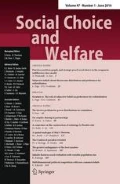Abstract
We determine, by means of max-*-transitivity, necessary and sufficient conditions for a fuzzy binary relation R defined on a countable (finite or denumerable) set A to be representable by a utility function. We display one example of its application.
Similar content being viewed by others
References
Barrett CR, Pattanaik PK, Salles M (1990) On choosing rationally when preferences are fuzzy. Fuzzy Sets Syst 34:197–212
Billot A (1992) Economic theory of fuzzy equilibria. An axiomatic analysis. Springer, Berlin Heidelberg New York
Billot A (1995) An existence theorem for fuzzy utility functions: a new elementary proof. Fuzzy Sets Syst 74:271–276
Bridges DS, Metha GB (1995) Representation of preference orderings. In: Lectures notes in economics and mathematical systems, vol 422. Springer, Berlin Heidelberg New York
Dasgupta M, Deb R (1996) Transitivity and fuzzy preferences. Soc Choice Welf 13:305–318
Debreu G (1959) Theory of value. Wiley, New York
Fishburn PC (1970) Utility theory for decision making. Wiley, New York
Fodor J, Roubens M (1994) Fuzzy preference modelling and multicriteria decision support. Kluwer, Dordrecht
Fono LA (2004) Relations binaires floues et application au choix social. PhD Thesis, Département de Mathématiques, Faculté des Sciences, Université de Yaoundé I - Cameroun
Fono LA, Andjiga NG (2005) Fuzzy strict preference and social choice. Fuzzy Sets Syst 155:372–389
Fono LA, Gwét H (2003) On strict lower and upper sections of fuzzy orderings. Fuzzy Sets Syst 139:583–599
Gwét H (1997) Normalized conditional possibility distributions and informational connection between fuzzy variables. Int J Uncertain Fuzziness Knowl Based Syst 5(2):177–198
Gwét H (2001) Fuzzy utility and non cardinal representation of fuzzy preferences. Health Syst Sci 4:117–132
Jain N (1990) Transitivity of fuzzy relations and rational choice. Ann Oper Res 23:265–278
Klement E, Mesiar R, Pap E (2000) Triangular norms. Kluwer, Dordrecht
Kreps DM (1990) A course in microeconomics theory. Heavester Wheatsheaf Campus, 400, Marylands
Ovchinnikov S (2000) Numerical representation of fuzzy transitive relations. Fuzzy Sets Syst 126:225–232
Ponsard C (1987) Fuzzy mathematical models in economics. Fuzzy Sets Syst 28:273–283
Salles M (1998) Fuzzy utility. In: Barberà S, Hammond JD, Seidl C (eds) Handbook of utility theory, principles, vol 1, chap. 8. Kluwer, Boston, pp 321–344
Sen A (1986) Social choice theory. In: Arrow KJ, Intrilligator MD (eds) Handbook of mathematical economics, vol 3, chap 22. Elsevier Sciences Publishers B.V., North Holland, pp 1073–1181
Sengupta K (1999) Choice rules with fuzzy preferences: some characterizations. Soc Choice Welf 16:259–272
Varian RH (2002) Introduction à la microéconomie, 5e édition. Traduction de la 6eme édition Americaine par Bernard Thiry, De boeck
Author information
Authors and Affiliations
Corresponding author
Additional information
The first author thanks AUF (Agence Universitaire de la Francophonie). This paper was revised when he was Visiting Researcher at CREM-University of Caen under the Research grant “Bourse Post-doctorale de la Francophonie 2005–2006”.
Rights and permissions
About this article
Cite this article
Fono, L.A., Andjiga, N.G. Utility function of fuzzy preferences on a countable set under max-*-transitivity. Soc Choice Welfare 28, 667–683 (2007). https://doi.org/10.1007/s00355-006-0190-3
Received:
Accepted:
Published:
Issue Date:
DOI: https://doi.org/10.1007/s00355-006-0190-3




